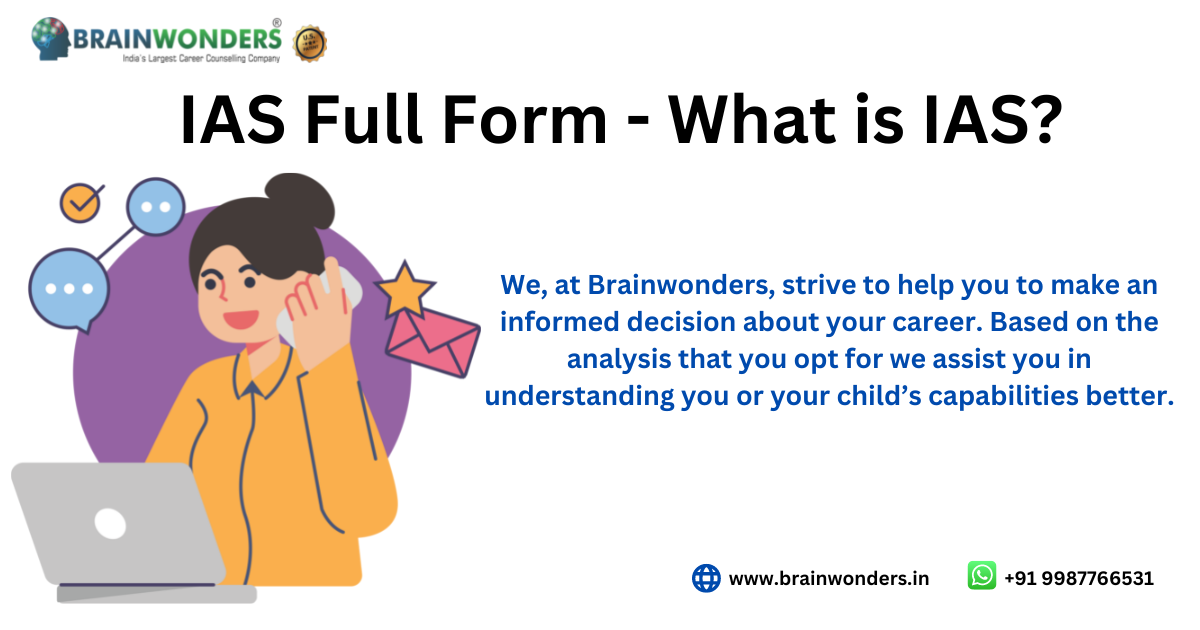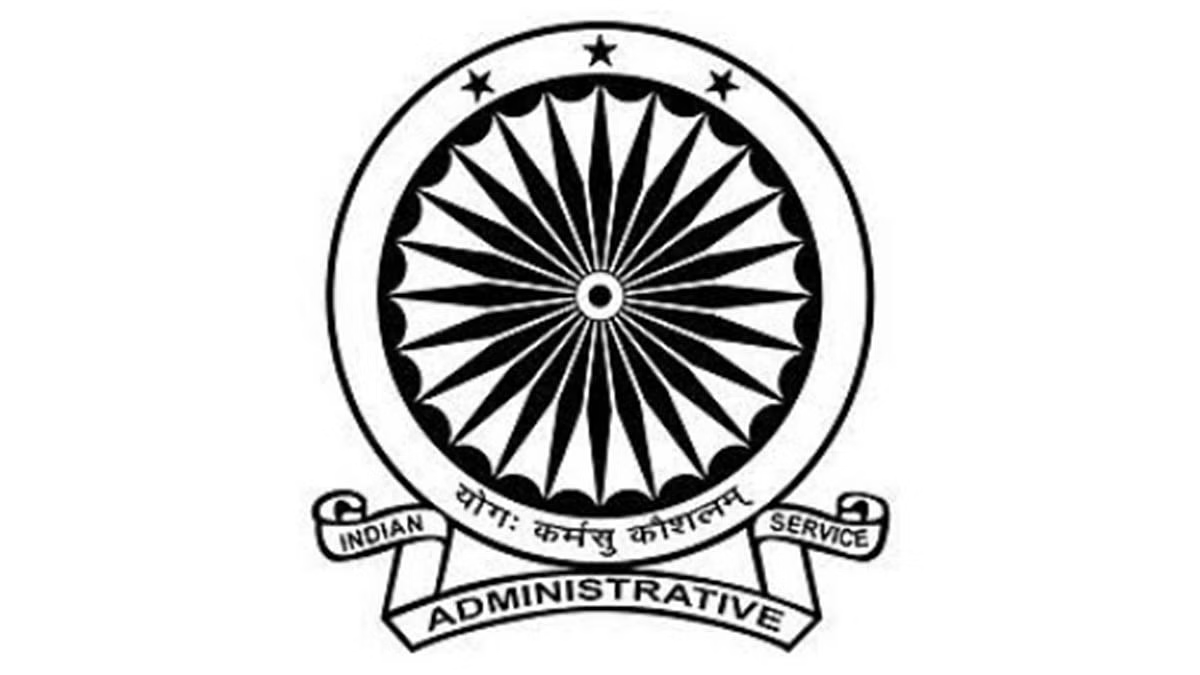

Are you aware which subjects and courses will bring you closer to your dream career?
Worry not, because the Brainwonders test and guidance will not only help you know it, but also follow it!
Blog
02 February,2024 | By Brainwonders

The Union Public Service Commission (UPSC) is an organisation entrusted with the responsibility of overseeing and conducting India's premier competitive examination, the Indian Administrative Service (IAS) Exam, formerly known as the Imperial Civil Service (ICS).
This highly competitive exam attracts nearly 10 lakh enrollees every year, with approximately 5 lakh appearing for the exam. The qualifying rate is less than 0.5%, making it one of the toughest competitive exams in the world.
The UPSC operates under Article 324 of the Indian Constitution, ensuring their compliance to all Indian Laws. They offer a level playing field to everyone regardless of age, ethnicity and socio-economic status who wishes to pursue a career through passing the IAS exam.
The IAS exam is composed of three stages - Preliminary Examination to determine eligibility, Main Exam for determining the rank and Personality Test which puts you on the path toward success. Through hard work and dedication, any individual can pass this competitive test and become part of India’s esteemed bureaucratic body.
Take the First Step Towards a Bright Future - Click Here
| IAS Full Form | Indian Administrative Services |
| IAS Salary |
|
| IAS Qualification |
|
| Work of an IAS officer | They work in Indian Bureaucracy |
| What is the IAS Exam? | It is an All-India level examination which is a part of Civil Services Examination. |
IAS full form is Indian Administrative Services, which is the civil service of India which acts as the foundation for the Bureaucracy and administration of the country. The top 24 candidates get an opportunity to become an IAS officer offered by UPSC through Civil Service Examination (CSE). The selected candidates are employed by the union government, state government, Public Sector Undertakings (PSU), and international organisations like United Nations International Monetary Fund, World Bank, etc. IAS forms the permanent executive branch of India.
The Union Public Service Commission, or UPSC, is India's premier central recruitment agency for the recruitment of all Group 'A' officers under the government of India. The UPSC exam is conducted in three phases: a preliminary examination consisting of two objective-type papers (General Studies Paper I and General Studies Paper II), and a main examination consisting of nine papers of essay type, in which two papers are qualifying, and only marks of seven are counted followed by an interview. The former is held in March yearly, whereas the latter is held in December. The total duration for the completion of this test is approximately 32 hours. The examinees who clear the exam are assigned to the positions of Indian Foreign Service (IFS), Indian Administrative Service (IAS), Indian Police Service (IPS), and others, depending upon the scores.

It consists of two papers (GS I and GS II/CSAT) based on objective questions. The marks scored in preliminary exams are not counted in the final list of Selections.
| Paper | Type | No. of Questions | Marks | Duration |
| General Studies I | Objective | 100 | 200 | 2 Hours |
| General Studies II/CSAT | Objective | 80 | 200 | 2 hours |
It consists of 9 papers, of which 2 are compulsory (English and Indian Language papers), 1 essay paper, 2 optional papers, and 4 GS papers. The remaining seven papers rank the candidate for the main selection. Exam papers are of descriptive type.
| Paper | Subject | Duration | Total Marks |
| Paper A | Compulsory Indian Language (Qualifying) | 3 hours | 300 |
| Paper B | English (Qualifying) | 3 hours | 300 |
| Paper I | Essay (Marks are considered for merit) | 3 hours | 250 |
| Paper II | General Studies I (Marks are considered for merit) | 3 hours | 250 |
| Paper III | General Studies II (Marks are considered for merit) | 3 hours | 250 |
| Paper IV | General Studies III (Marks are considered for merit) | 3 hours | 250 |
| Paper V | General Studies IV (Marks are considered for merit) | 3 hours | 250 |
| Paper VI | Optional Marks I (Marks are considered for merit) | 3 hours | 250 |
| Paper VII | Optional Marks II (Marks are considered for merit) | 3 hours | 250 |
The essential prerequisites that one has to fulfill in order to qualify for the IAS exam are as follows:
| Category | Upper Age Limit for UPSC | Maximum Number of Attempts |
| General | 32 | 6 |
| Economically Weaker Sections (EWS) | 32 | 6 |
| OBC | 35 | 9 |
| SC/ST | 37 | Unlimited |
| Defence Services Personnel | 35 | 9 |
| Persons with benchmark disability | 35 | 9 |
The UPSC recruitment process is drawing to a close and the final stage is an interview. The UPSC board oversees this phase, which is designed to gauge candidates' personality traits such as confidence, honesty, integrity, empathy, and understanding of ground realities. During the interview, questions are asked that assess various administrative skills, realistic thinking, timely decisions, and knowledge of current international events. This stage comprises 275 marks and is essential for the successful completion of the selection process.
Note: The examination attempt will only be counted if you appear for the exam. Skipping the prelims exam to save the attempt may lead to absenteeism.
Also Read: Know more in detail about UPSC – Union Public Service Commission
The roles of an IAS officer are classified into the following three types:
Every IAS officer has to fulfil a field assignment after Training. Their function depends on their rank and postings.
He is the chief civil officer of the sub-division who enjoys adequate powers to coordinate work in the sub-division. The main duties included revenue, executive, magisterial, development works, and judicial works.
District Collector is responsible for enforcing law and order and collecting revenue to implement national and state policies on welfare and planned development. The District Collector links the government and the district's residents. The duties and functions are mentioned below:
IAS officers use previous field experiences to advise the representative policies and make decisions for the government.
These undertakings include power stations, industrial units, defense units, etc.
They look after policy reviews, formulation, and implementation for different ministries. Many IAS officers are also placed at United Nations, World Health Organisation, World Trade Organisation, etc. However, the duties of the candidates are difficult to handle and need candidates with Intelligence.
Find Out: Best 20+ Central Government Exams after Your Graduation
Every candidate seeking to take the IAS exam needs to have a long-term strategy and proper guidance in order to succeed. They should start their preparation for the exam a year before the scheduled date of the exam, as this allows for ample time for revision. It is important to note that the IAS exam tests a candidate's personality and hard work rather than solely relying on verbal, written, and general knowledge tests. Consequently, an effective approach to succeed in this examination is to ensure that they can retain all topics studied in their mind. Furthermore, it would be beneficial if students find the best institute to help them prepare for the challenging IAS exam along with dedicating sufficient hours to study.
Follow the below-mentioned tricks in a time-bound manner to clear the IAS exam:
An IAS officer is an esteemed position of power, allowing them to make a positive impact on the lives of millions of people. They are accorded tremendous respect within society, and have the opportunity to use their talents and abilities to promote social projects in health, education, and the economy. In addition to these opportunities, IAS officers enjoy lucrative salary benefits that can further augment their already impressive career. Insights into the specific advantages offered by this esteemed role are discussed in detail below.
All the above perks are enjoyed by the IAS officers and the department of personnel and Training keeps updating the manuals as the civil servants are answerable to the State and Central Governments.
Visit Page: Brainwonders Interest Test || Apply for online interest test
A Pay Commission is elected by the Central Government to finalise the salary of government employees. However, the final decision rests in the hands of the Central Government. The salary is also affected by the inflation rate, but it mainly increases with time. Moreover, everything from transport to house is at the expense of the government.
The IAS officer is paid INR 56k as the basic pay, 16.5k as the grade pay. Also, the maximum salary of a senior IAS can reach INR 2.5 lakh as the Cabinet Secretary of India.
The IAS cadre is divided into 8 ranks or grades. The promotion of IAS officers happens every 4 to 5 years. However, the salary of an IAS officer depends upon their experience, rank, and pay grade. The retirement package comes with house help, transport facility, and security for the family.
| Pay Grade | Grade | Basic Pay | Grade pay | Service Period | Post |
| 10 | Junior Scale | INR 50k to INR 1.5 lakh | INR 16.5k | 0-4 Years | SDM, SDO, ADM |
| 11 | Senior Time Scale | INR 50k to INR 1.5 lakh | INR 20k | 5 Years | DM, DC, Joint Secretary |
| 12 | Junior Administrative Grade | INR 50k to INR 1.5 lakh | INR 23k | 9 Years | Special Secretary, State Government Department Heads |
| 13 | Selection Grade | INR 1 lakh to INR 2 lakh | INR 26k | 12-15 Years | Ministry Department Head |
| 14 | Super Time Scale | INR 1 lakh to INR 2 lakh | INR 30k | 17-20 Years | Director of any Ministry |
| 15 | Above Super Time Scale | INR 1 lakh to INR 2 lakh | INR 30k | Not Fixed | Commissioner, Additional Secretary |
| 16 | Apex Scale | INR 2.4 lakh (Fixed) | NA | Not Fixed | Chief Secretary in Ministries |
| 17 | Cabinet Secretary Grade | INR 2.7 lakh | NA | Not Fixed | Cabinet Secretary |
The syllabus for prelims and main mostly match but the demand for the knowledge for both is different. Prelim exams contain history geography polity and Indian constitution economy environment and current affairs while the main exam there are some more sections in GS1 paper like world history and Society in GS2 paper exercise section includes International relations and in GS3 paper includes security, essay, and optional. Film exam is based on objective types of questions while the main exam is based on subjective types of questions and the interview is a viva exam that checks the personality of the candidate.
Visit Page: DMIT Test by Brainwonders || Know Your Hidden Potentials with Brainwonders.
In the final stage of the UPSC CSE exam, the candidates are tested not on the basis of the knowledge which they have studied but also the smartness at the present moment. The judges also check the confidence level of the candidates.
The IAS exam requires a lot of hardworking dedication from the candidate. A detailed strategy for covering all the subjects and identifying your strengths and weaknesses to prioritise things accordingly must be kept in mind before preparing for the exam. Apart from the minimum sleep of 6 to 7 hours with a well maintained balanced diet including dry fruits must be kept in mind. The candidate's must stick to their schedules instead of procrastinating. The position of an IAS is well reputed in our society and their huge respect. A part of various benefits IAS officers also get a huge opportunity to serve the nation and bring the changes which give some a huge satisfaction for becoming a change agent. Every candidate must put in all the hard work and dedication and two people on their exam to become an IAS officer.
1. What is the full form of IAS?
Ans: IAS stands for Indian Administrative Services.
2. How many papers are there in the UPSC CSE main exam?
Ans: The main exam is 9 papers. However, only 7 are used for ranking.
3. What is the starting salary of an IAS officer after completion of 2 years of Training?
Ans: The starting salary of an IAS officer is 56 k which can also go higher after their performance and experience.
4. What other benefits does an IAS officer get apart from salary?
Ans: As an Indian Administrative Service (IAS) Officer, one is provided with various additional facilities such as travel and transport allowances, accommodation allowance, and a range of other incentives. These benefits are only a fraction of the generous offerings extended to IAS Officers, who additionally enjoy discounts when travelling to foreign countries.
5. What is Special Pay advance?
Ans: Special advance is a term that is used for the stipend amount that an IAS officer receives during Training. It is supposed to be INR 45k but the final amount received is INR 38.5k.
6. What are the other duties of an IAS officer apart from the task in India?
Ans: An IAS officer also has to represent the nation on an international level for negotiation like in UN, WHO, etc.
Worry not, because the Brainwonders test and guidance will not only help you know it, but also follow it!
_Course,_Admission,_Fees,_Salary,_Duration,_Syllabus,_Colleges.png)

